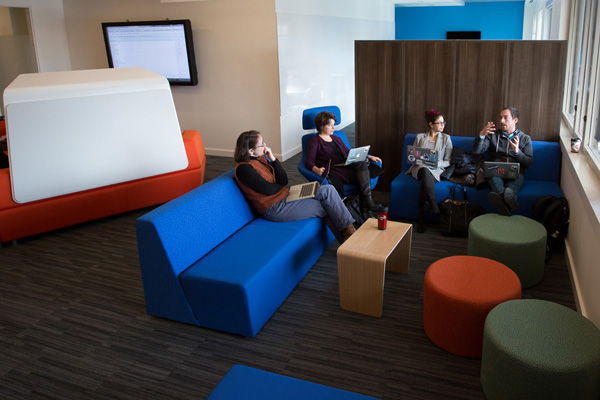Faculty: welcome to the DSC

The Digital Scholarship Commons, which opened earlier this semester at Snell Library, serves as a “one-stop-shop” for faculty and doctoral students to access a range of high-level services for digital scholarship, teaching, and research.
At the multi-dimensional resource center, faculty and doctoral students can consult with library personnel and experts in technology and learning science to discover and share best practices for teaching and learning and for using the latest technology, hardware, and software to enhance their research projects and instruction. It also serves as a collaborative space where they can meet with other faculty members across disciplines, and hold workshops and meetings with students.
The DSC, located on the library’s second floor, is directly connected to several key campus resources: the library’s Digital Scholarship Group, a research group responsible for developing and supporting cutting-edge infrastructure for digital scholarship; Academic Technology Services, a unit of Information Technology Services that consults, supports, and helps faculty identify and implement technological solutions for their teaching and research activities and goals; and the Center for Advancing Teaching and Learning Through Research, which takes a multi-faceted, research-based approach to help faculty and administrators provide the Northeastern community with opportunities for lasting learning.
Faculty tours of the space began this month.
“The Digital Scholarship Commons was created to synthesize the resources and services all these groups provide,” said Julia Flanders, head of the Digital Scholarship Group and a Professor of the Practice in the Department of English.
For instance, a faculty member may come with questions about using GIS mapping software or digital publishing tools. That person could take advantage the Digital Scholarship Group office hours and also meet with a learning scientist at the Center for Advancing Teaching and Learning Through Research to discuss ways in which this technology could be used as a learning opportunity for students both in and out of the classroom.
“The DSC offers our faculty and students incredible opportunities for collaborative scholarship and research. This is the first time there has been a space like this on campus, ” said Stephanie Trowbridge, associate director for Academic Technology Services.
“The faculty will make this into whatever they need it for,” added Cigdem Talgar, director of the Center for Advancing Teaching and Learning Through Research. “It’s a great opportunity to problem solve and get to the root of whatever technology, research, and teaching challenges they’re facing, and it’s also a meeting space that allows for intellectual, interdisciplinary discourse.”

The Digital Scholarship Commons, which opened earlier this semester at Snell Library, serves as a dedicated meeting space for faculty and doctoral students to access a range of high-level services for digital scholarship, teaching, and research. Photo by Mariah Tauger.
The DSC is currently open Monday through Friday between 8 a.m. and 5 p.m., though extended hours are coming soon. Users must swipe their Husky card to enter.
The space features a variety of workspaces and technology services. At one end, there is a computer lab for small groups to meet and work; at the other, two interactive workspaces allow multiple users to plug in their laptops and take turns accessing a high-definition screen. The space also features sleek computer bars, a conference table, and several cozy spaces with colorful couches and chairs for small-group meetings.
The DSC’s completion concludes the final phase of the Digital Media Commons’ expansion. Over the past two years, Snell Library in general and the Digital Media Commons in particular have undergone a significant transformation to provide greater access to educational technology, enhance study space, and create innovative opportunities for teaching and learning. The renovations include adding collaborative workrooms, audio and video recording studios, new furniture, 3-D printing, revamped computer labs, and other technology resources.
The DMC is a media lab and digital creativity center where students and faculty can utilize a range of technologies, including new animation, audio and visual editing, and game design software.





